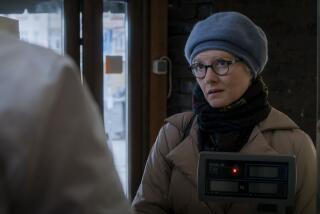Daum: Jaycee Dugard and the feel-good imperative
- Share via
To watch Diane Sawyer’s interview Sunday night with Jaycee Dugard was to wonder at times if that was Dugard herself on screen or an actress hired to play the role of the quintessential survivor. Dugard was so serene and lacking in rancor that it was hard to believe she had been kidnapped at age 11 and held prisoner for 18 years, during which she was repeatedly raped and bore two children, the first when she was just 14.
But there she was, saying things like “there is life after something tragic” and joking about how being locked indoors for so many years was her secret to smooth skin.
The interview, tied to Dugard’s just-published memoir, scored big in the ratings. As with the 2002 abduction of Elizabeth Smart, Dugard’s story has generated pity, anger and prurient fascination. It’s a story that’s horrifying in pretty much every imaginable way. Dugard was kept in handcuffs, forced to give birth in a backyard shed and so psychologically damaged that she passed up several opportunities to escape over the years. What’s more, parole officers checking on her captor, convicted sex offender Phillip Garrido, managed to miss Dugard 60 times.
These revelations, stunning and grotesque as they are, haven’t kept the events from being framed as the kind of tale Americans love best: a redemption story. Although we’re not being asked to forget what Dugard endured or to forgive law enforcement’s unconscionable negligence, it’s clear that just about everyone involved in revealing what happened — from Sawyer to People magazine (which, shortly after Dugard was found, reported on her “sense of comfort and optimism”) to Dugard herself — is invested in the notion that this ultimately is a feel-good story. As Sawyer listened to Dugard read from the journal she kept during her captivity — “I am so lucky and blessed for all the wonderful things that I do have” — you can almost see your great-aunt typing them into an email and forwarding them to 100 people under the heading “Words to Live By.”
It’s interesting (and perhaps not entirely coincidental) that the Dugard special aired around the same time as ABC’s announcement that Smart, now 23, would be joining the network as a commentator on missing-persons cases and child abductions. It’s an appointment that generates a certain queasiness. Doesn’t Smart, who was kidnapped at 14 and raped repeatedly over nine months, want to move on with her life? In fairness, she’s already established as a victims rights advocate, but as with Dugard, I detect a need on the part of the media to wrap her story up in a bow, to assure the public that she’s OK, to reinforce the central narrative of just about everything we see on TV: Change is possible, maybe even easy; that adversity can be overcome; and that, as Dr. Phil likes to say, there are no victims, only volunteers.
The trouble is, that’s simply not true. Dugard and Smart seem to have successfully made the transition to survivor, but to turn them into generic symbols of hope or, worse, to saddle them with the job of being publicly loving, forgiving and grateful despite what they endured minimizes their trauma and panders to audiences by creating a false sense of closure.
The redemption narrative (along with its corollary, the recovery narrative) is dependent on closure — especially on TV. We watch the addict, the obese person and the villainous reality show contestant in the sure and certain hope that sobriety, fitness and a trip off the island are right around the corner. Part of the reason the Casey Anthony verdict touched such a nerve was that it didn’t conform to the redemption narrative. The survivor was anything but a hero. No lessons were learned.
None of this is to say that Dugard’s grace isn’t genuine or that Smart won’t do just fine as a talking head. When Sawyer introduced Dugard as “a woman who endured the unimaginable and emerged with powerful lessons on love and life,” she certainly wasn’t wrong. But Dugard undoubtedly emerged with a lot more than that. All’s well that ends well is more spin than reality. That’s why we’d do well to recognize Dugard’s courage not just in the face of the story she’s telling but the one she’s living.
More to Read
Sign up for our Book Club newsletter
Get the latest news, events and more from the Los Angeles Times Book Club, and help us get L.A. reading and talking.
You may occasionally receive promotional content from the Los Angeles Times.











